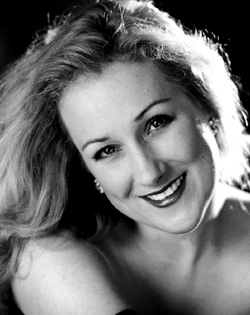|
Back
Fate (And Frolic) Knocks At The Door New York
Stern Auditorium, Carnegie Hall
01/24/2010 -
Franz Schubert: Symphony No. 8 "Unfinished”, D. 759
Richard Strauss: Das Bächlein Op. 88, No. 1 – Ich wollt’ ein Sträusslein binden Op. 68, No. 2 – Allerseelen, Op. 10, No.3 – Zueignung, Op10. No.1 – Morgen, Op. 27, No. 4 – Ständchen, Op. 17, No.2 – Wiegenlied, Op. 11, No. 1 – Amor, Op. 68, No. 5 – Grossmächtige Prinzessin, from Ariadne auf Naxos, Op. 60
Ludwig van Beethoven: Symphony No. 5 in C Minor, Op. 67
Diana Damrau (Soprano)
The MET Orchestra, James Levine (Music Director and Conductor)

D. Damrau (© Virgin/EMI Classics)
Say it isn’t so. Say it can’t be true, that James Levine, not only the Master, but the Maestro of all he surveys, has been upstaged. And upstaged by….by a mere lyric soprano.
But yes, it was true, Diana Damrau–who could upstage both Madonnas if she wanted–simply overwhelmed Carnegie Hall yesterday afternoon, as she has overwhelmed every opera house she has ever placed her gorgeous soprano. At first it seemed like legerdemain, where her voice leaped magically into any place we least expected it. But then, her trick was exposed. Mr. Damrau sings like Joshua Bell plays, taking every note with the fluidity and ease of a Strad violin.
When Ms. Damrau reached above high C in Zerbinetta’s fiendish aria from Ariadne, nobody was kept in suspense. We knew with certainty that she would reach as high as she needed, and now all we wanted was to check the voice (silvery), the trills (smooth as silk), the acting...
Ah, her acting. We have all heard those times when a good soprano with a “modern” look at women’s plights might make this confession seem wistful, almost tragic. But this was hardly what Hugo von Hofmannsthal had in mind. Like Richard Rodgers’ “I’m Just A Girl Who Can’t Say No”, Zerbinetta loved and loves all men. Ms. Damrau sung it with joy: sometimes clowning (this wasn’t the Met, this was a concert hall), sometimes tossing her shimmery pastel skirts around like Carmen in the mountain hideout.
And if she upstaged Mr. Levine, he reveled in it. The two, with the skeleton MET Orchestra, encored the last part of the roulade and Ms. Damrau was even more outrageous.
With a voice like that, she can do whatever she wants.
The eight Strauss songs showed her most lyrical side. Granted, almost all the music was in the highest register, and she was fresh and charming. In the more full-blooded Allerseelen, her voice turned from quicksilver to golden, again effortlessly.
As for the wonderful MET Orchestra, one could have questioned what Mr. Levine was doing conducting the two most popular symphonies in the repertoire as bookends. With the first notes of the Schubert, the rationale was evident. Mr. Levine was so emphatic with this first movement, the great chords and tympani were so forceful, he seemed to carry Beethoven’s “fate” motive directly to Schubert. Nor was the Beethoven “another Fifth”. Mr. Levine didn’t need a thunderous symphony to make his point. It was concise (in neither symphony did he take the repeats), it was urgent, and the final chords had not so much a finality as a warm and well-deserved triumph.
Harry Rolnick
|